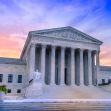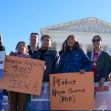The U.S. Supreme Court sided with Alaskan Native Corporations over arguments as to whether or not they would be eligible for funds under the CARES Act.
At the height of the pandemic, the Coronavirus Aid, Relief, and Economic Security Act (CARES Act) allocated $8 billion in COVID-19 relief for “Indian tribes.” Under the Indian Self-Determination and Education Assistance Act, the term “Indian tribes” is defined as “any Indian tribe, band, nation, or other organized group or community, including any Alaska Native village or regional or village corporation as defined in or established pursuant to the Alaska Native Claims Settlement Act, which is recognized as eligible for the special programs and services provided by the United States to Indians because of their status as Indians.”
The Treasury Department determined that Alaskan Native Corporations, or ANCs, fell underneath this umbrella definition, yet several federally recognized tribes argued against this distinction. A lawsuit subsequently followed in April 2020 in an attempt to prevent the CARES Act funds from being distributed to the ANCs in question. Shortly after the lawsuit was filed, on June 26, 2020, U.S. District Judge Amit Mehta ruled that the ANCs in question should have access to the aid. Judge Mehta also used the tribal definition under the Indian Self-Determination and Education Assistance Act to base his decision. The win for the ANCs was short-lived after the U.S. Court of appeals for the D.C. District overturned the ruling on September 25, 2020, in which the court deemed that the ANCs were indeed ineligible for the funds.
An amicus curiae brief filed by the Alaskan congressional delegation explained that the decision to keep the funds away from the ANCs could have lasting damages to Alaskan natives. The delegation's pushback explains, “The ruling by the D.C. Circuit deeming ANCs as ineligible for this critical funding is unacceptable as it goes against the language of ANCSA, ISDEAA, and the CARES Act, erasing more than 45 years of precedent, with the potential to undo the tribal systems of healthcare, education, housing, and more.”
After the case was heard in the Supreme Court, ANCs succeeded as the court ruled in a 6-3 vote that the ANCs did have legal rights to the funds as they were in fact constituted as tribes under the ISDEAA.
Justice Sonia Sotomayor wrote for the majority which was composed of Chief Justice John Roberts and Justices Stephen Breyer, Brett Kavanaugh, and Amy Coney Barrett. Justice Samuel Alito mostly joined in the opinion. Sotomayor explained that the term “recognized” would be looked at in its “ordinary meaning.” Sotomayor likened the semantics to a restaurant advertising, “50% off any meat, vegetable, or seafood dish, including ceviche, which is cooked.” She explains that a customer could correctly include the ceviche as part of the discount even though it is prepared raw. Sotomayor explains, “Like applying a ‘cooked’ requirement to ceviche,” she continued, “applying a ‘federally recognized’ requirement to ANCs is implausible in context.”
The dissenting opinion of Justice Neil Gorsuch, joined by Justices Clarence Thomas and Elena Kagan, explained that the term “recognized” should be recognized as a ‘“formal term of art.” Justice Gorsuch explains, “If ISDEAA really does capture any group merely ‘eligible’ for federal benefits, why not just say that and avoid introducing a term with a particular and well-established meaning in federal Indian law?”
Alaskan Senator Lisa Murkowski’s office shared in a statement, “Today, the U.S. Supreme Court affirmed what we knew all along—that when Congress used the definition of “Indian Tribe” from the Indian Self Determination and Education Assistance Act in the CARES Act, it absolutely made Alaska Native Corporations eligible for these coronavirus relief funds." The statement continues, “In addition to equitable pandemic relief, this decision ensures Alaska Natives will continue to benefit from the unique but effective delivery of health care, housing, and many other public services authorized under numerous statutes using ISDA’s definition of an Indian tribe, which the D.C. Circuit ruling threatened to destabilize. Once again, the Supreme Court made it clear: Alaska is different – the exception, not the rule.”
Though this textual-based ruling sided with the ANCs, Sotomayor wrote that the ruling “does not open the door to other Indian groups that have not been federally recognized becoming Indian tribes under ISDEAA.” and she emphasized that this ruling does not make ANCs “Indian tribes” and instead, the ruling “affirms what the Federal Government has maintained for almost half a century.”






